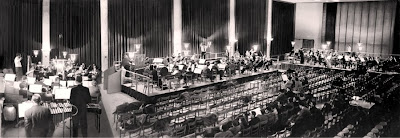Classic misunderstandings - Hildegard
 In my post Hildegard comes to Norwich via IRCAM and Darmstadt I wrote about James Woods' excellent new opera Hildegard, which was premiered at the recent Norwich and Norfolk Festival in Norwich Cathedral. I found it thrilling, but did comment on its uncompromising and avant garde nature, and liberal use of amplification, sound effects, batteries of percussion (via the Percussion Group The Hague), all in a score which explores microtoanlity and multiphonics. James Woods' track record includes commissions from IRCAM, and a period as Professor of Percussion at the Darmstadt Summer school, and he has premiered a Stockhausen work. So, it is fair to say, for some ears the opera may have sounded more bleeding-edge than leading-edge.
In my post Hildegard comes to Norwich via IRCAM and Darmstadt I wrote about James Woods' excellent new opera Hildegard, which was premiered at the recent Norwich and Norfolk Festival in Norwich Cathedral. I found it thrilling, but did comment on its uncompromising and avant garde nature, and liberal use of amplification, sound effects, batteries of percussion (via the Percussion Group The Hague), all in a score which explores microtoanlity and multiphonics. James Woods' track record includes commissions from IRCAM, and a period as Professor of Percussion at the Darmstadt Summer school, and he has premiered a Stockhausen work. So, it is fair to say, for some ears the opera may have sounded more bleeding-edge than leading-edge.I did comment that some of the audience left during the performance because Hildegard didn't quite seem to be what they were expecting. I am grateful to my friend Chris Marr, who works in the most excellent Prelude Records in Norwich, for the explanation. Like Piable Chris is a fan of contemporary music. It appears that the main regional newspaper in the Norwich area, the Eastern Daily Press (which has been chronicling Norfolk life since 1870) carried a preview of the opera the morning before the performance. The EDP's music critic saw the name Hildegard in the Festival programme, and wrote the following rave preview of this uncompromisingly avant garde (and ninety minutes long without an interval) work in his paper to fill the seats................
Ditch the telly, dump the valium. Let's unwind instead by pouring a hot bath and a large glass of wine, lighting some candles and listening to Hildegard of Bingen. Bach may be best for every occasion, but early music is great for late-night lullabies - confirming, in the words of the medieval Norwich mystic Julian, that all shall be well and all shall be well and all manner of things shall be well. But tonight water, wine and candles will have to wait - as will yet another airing of the 1995 CD Heavenly Revelations (Naxos 8.550998, a blissful £4.99 bargain). For singers and performers are staging a Hildegard tribute in the fitting setting of Norwich Cathedral.
The 10th child of aristocratic parents in the Rhineland, Hildegard entered a convent in 1106 at the age of eight. She died, at 80, an abbess of (good and bad) repute. Julian of Norwich she was not. She surrounded herself with nuns of similarly noble birth and they worshipped in fine jewels and fabulous headgear. I picture a sort of angelic Ascot. Hildegard wrote treatises on medicine and natural history.
A gift for prophesies brought powerful rulers flocking to her gaudy court - I mean, her godly convent. But it was the setting of her visions to poetic choral music that clinched her place in history. Some thought her theology dodgy and her tone suspiciously sensual, but her work speaks to us very directly today, She uses echoes and repetitions like Bach, and like leading contemporary composers (Part, Nyman, Glass). In the broadest sense she creates an image of perfect harmony. Perfect for our cathedral from 9pm today. Can't wait.
If you enjoyed this post try First performance - Douglas Weiland's Second Piano Trio, Pavey Ark
Any copyrighted material on these pages is included as "fair use", for the purpose of study, review or critical analysis only, and will be removed at the request of copyright owner(s). Report broken links, missing images and errors to - overgrownpath at hotmail dot co dot uk









Comments